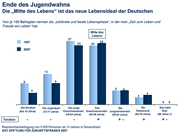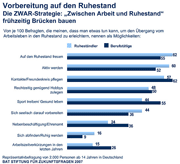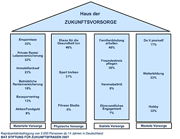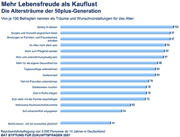Dreams of old age: illusion and reality
End of the youth craze.
The „centre of life“ is the new ideal of life for Germans
For the first time in history, there are signs of a shift in the ideal age. Middle age, from the age of 25 to 49, is increasingly replacing youth. One in four Germans (26%) think of adulthood as the „most beautiful phase of life“. But only 9 per cent think of their youth. Within just ten years - in the period from 1997 to 2007 - childhood and adolescence lost their appeal (-4 percentage points each). However, young adulthood also lost popularity for the first time (-1 percentage point). These are the findings of a comprehensive future study on the life situation of the older generation, which the BAT FOUNDATION FOR FUTURE QUESTIONS presented to the public today together with its co-operation partner Deutscher Ring. A representative survey of 2,000 people aged 14 and over was conducted throughout Germany.
The power of the „new old“:
Generation 50Plus shapes the future of society
As society ages, the power of older people as consumers is also increasing. Anyone who wants to participate in the billion-euro market of the „new seniors“ in the future must adapt to their needs and provide a dual service: To secure their acquired standard of living (e.g. through savings, insurance, shares or property) and at the same time help to improve their personal quality of life (e.g. through cultural offerings, health services and travel services). Consumer spending is at its highest not at the age of 15, 25 or 35, but at over 50. „It is not glitz and glamour, but atmosphere and ambience, service and quality of life that are at the centre of their consumer interests. What fitness, sun and fun are for younger people, meaning, vitality and joie de vivre are for older people. The meaning factor is just as important for older people as the fun factor is for younger people,“ says Prof Dr Horst W. Opaschowski, Scientific Director of the BAT Foundation. If the number of over-50s in Germany doubles over the next few decades, then this future market could also double.
Those who focus on the three generations 50plus, 65plus and 80plus today are occupying and owning the growth areas of the future. A social paradigm shift is imminent: youth is becoming a thing of the past and ageing an investment in the future! We know almost everything about the young people of today, but almost nothing about the new senior citizens of tomorrow. However, falling birth rates and increasing life expectancy are forcing us to rethink. We have to say goodbye to the age of youth culture and open up more to the world of the „new seniors“, who are family people (55%) and nature lovers (47%), social people (37%) and theatre-goers (13%), pleasure-seekers (14%) and hobbyists (13%), churchgoers (9%) and club members (10%) all at the same time.
Preparing for retirement
Building bridges at an early stage with the Zwar strategy: „Between work and retirement“
Prof Dr Horst W. Opaschowski and Dr Ulrich Reinhardt, the two authors of the study on the future entitled „Ageing dreams. Illusion and Reality“, prove that the majority of employees will want to leave work early or will have to do so: The majority of employees will want to or have to give up work prematurely in the future. The job for life will be just as rare as the career biography from training to retirement. The individual question of meaning is becoming more acute, as most people are not prepared for a life without work. Opaschowski: „Bringing retirement forward without a goal and without a task triggers anxiety. This is associated with the admission that they are unable to face this new challenge in life adequately. After all, you can't suddenly be a different person.”
However, confidence grows with increasing age. Only one in five retirees (21%) state that there is generally nothing they can do to make the transition from working life to retirement easier. In contrast, two thirds (66%) are full of hope. However, retirement itself should then be organised as actively as possible. The older generation's advice to working people is therefore to „always keep busy“ and just „not hang around” (60%) and to take up hobbies early on (48%). In this way, emerging questions, doubts and problems can be suppressed at least temporarily - as a form of occupational therapy and distraction manoeuvre. Every second working person also sees this as an opportunity. The connection to work seems to be particularly helpful. In the last few years before retiring, the recommendation is to voluntarily reduce your own working hours and try to work less year after year, to „sneak away from work“, so to speak. The flexible or smooth transition into retirement will also be easier if people look for part-time jobs and voluntary work at the same time (24%).
Provision for the future in the 21st century
Creating several pillars
The most enduring and sustainable form of old-age security is undoubtedly quality of life. A happy life primarily includes one's own health (98%), friendships (91%), family/children (87%) - followed by leisure time (79%), culture and education (72%). These are the population's answers to the question of what is really important in life. The very personal „house of provision for the future“ should be built on four supporting pillars. These include: personal health, social relationships, financial security and mental provision.
1st pillar: Material provision
Financial provision for the future is the most frequently discussed topic. Only a minority of Germans still believe in the state pension. Currently, only 13 per cent of Germans believe that their pension will be secure in the future. The middle generation between the ages of 35 and 54 is particularly pessimistic (or perhaps realistic) about the future. They seem to have given up hope of being able to realise a pension in old age through the state pension alone - only one in fifteen in this age group still believes in the state pension (7%). In this respect, in future this can at best be a basic security in the sense of securing a livelihood.
Only a private supplementary pension guarantees that the previous high-consumption lifestyle of hobbies, sports, holidays and leisure activities can be largely maintained. People have recognised this and are making private provision for their old age. Almost three quarters of all Germans (73%) have made material provisions for their old age - western Germans (79%) significantly more than eastern Germans (59%). The type of measures is diverse and varied:
- Around one in three Germans (32%) is making specific provision for old age through private life or pension insurance. This is particularly true for the middle generation (34 to 54 years), for whom this type of provision is the most important (44%).
- Almost one in five Germans (18%) use company pensions as a means of providing for their retirement. This form of protection is particularly popular among white-collar workers (23%).
- One in three (35%) is making provisions for old age through savings, 13 per cent through building society savings contracts. The 50 to 64-year-olds (46%) and retirees (43%) are the most avid savers - both with increasing tendencies. Their savings habits are much more pronounced than those of the younger generation aged up to 34, for example (17%). Instead of savings accounts, the younger generation tends to favour building society savings contracts (15% - 55plus generation: 8%).
- The stock market boom and historic highs of the DAX have not had a decisive impact on the pension sector. Shares, funds and fixed-interest securities are only attractive for around one in twelve Germans (8%). Those with a high school degree (19%) and those with a net household income of over 2,500 euros (16%) make the most use of them, while singles aged 25-49 make the least use of them (2%).
- Owning your own four walls is becoming increasingly important. Almost one in four Germans are making provisions for their old age by buying property (house, condominium). This is particularly true for young senior citizens aged 50 to 64 (32%).
2nd pillar: Physical prevention
Germany is facing a radical structural change in the healthcare system. The political appeal to citizens to take more personal responsibility in future is merely a positive euphemism for the need to take on more of their own responsibilities. The population has recognised this and is prepared to do more for their own health (40%). Sport is also a way for one in three Germans (31%) to keep physically fit.
3rd pillar: Social security
When it comes to social provision, two out of five Germans (40%) see maintaining family ties as a vital precautionary measure for old age - and act accordingly. Women attach slightly more importance to this (42%) than men (37%), rural dwellers more (43%) than city dwellers (32%) and couples (47%) significantly more than singles (20%). However, retired people (49%) attach the most importance to family ties. For them, the family is the main pillar in old age.
In addition to family, the second important investment for the future in old age is maintaining a circle of friends. Friends and family are rated almost equally highly by both the population as a whole and retirees. In addition to retirees, maintaining a circle of friends is particularly important for the best agers (50 to 64-year-olds) (48%). Surprisingly, the circle of friends is less important for singles (25%). Dr Reinhardt: „Almost all Germans systematically maintain contact with friends - not only for the pleasure of socialising, but also and especially with the idea of creating something lasting for life, which may even „pay off“ or „pay off“ in old age. Despite all the friendship, rational considerations play a not insignificant role: the circle of friends can be the basis for a social quality of life in old age.“
4th pillar: Mental provision
However, people also need to be able to help themselves and keep busy in old age. For one in six people (17%), do-it-yourself and for one in three (32%) their own hobby are therefore mental provision options. Men in particular want to devote themselves to their own hobbies in retirement. Male domains are also the club and the regulars„ table. Socialising and exchanging ideas go hand in hand with having fun and passing the time. In this respect, clubs have a new future ahead of them. They guarantee social security in and with the group and, as an “offer for all", are also affordable for everyone.
Ageing dreams of the 50-plus generation:
More joie de vivre than a desire to buy
The dreams and aspirations of the 50-plus generation for the future are centred on enjoying life more. In the truest sense of the word, this is about feeling good in their own skin and in their own four walls. Therefore, the three most important wishes of the 50-plus generation for the future are: staying mentally fit (100%), being carefree and financially secure (97%) and maintaining lasting relationships with family and friends (93%). The older generation does not want to stand still mentally, but wants to keep moving, so sometimes prefers to attend intellectually challenging ‚lectures at university’ (23%) rather than settle for ‚regulars’ tables‚ or ’coffee mornings' (17%).
Professor Opaschowski: „It is not dream ships and dream trips that are at the centre of older people's wishes, but mental fitness, social contacts and material security. The latter has little to do with prosperity or the accumulation of material goods. It is more about freedom from money worries and existential fears. Living carefree, i.e. having good provisions, and being financially secure are at the top of the wish list. This war and post-war generation of duty fulfilment wants to be a generation of joie de vivre“. The joy of feeling free increases significantly with age. Dreams of the good life resemble wishes with a down-to-earth attitude. Older people want to have both feet on the ground and be free from worries. That is their greatest happiness.
But they don't get this happiness in old age for free. They have to do something about it. Against the backdrop of the discussion about „minimum wages“ and „minimum pensions“, this starts with private provision in the sense of material security, continues with maintaining and intensifying social contacts with family, friends and neighbours and ends with the effort not to forget oneself selflessly. Because without your own health, almost everything is worth nothing. For the 50-plus generation, it is therefore clear that they must „do more for their own health“ (86%), i.e. stay physically, mentally and socially fit in order to avoid „becoming a care case“ (92%) in old age. Those who know how to live this way can prevent today's dreams of old age from becoming tomorrow's nightmares.
The book
HORST W. OPASCHOWSKI/ULRICH REINHARDT:
„Dreams of old age - illusion and reality“
will be available in bookshops from 11 October 2007:
ISBN 978-3-89678-361-5 (Primus Verlag) - 2007 - 14,95 Euro
See also directory of all publications






